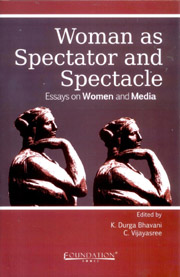Book contents
- Frontmatter
- Contents
- Notes on Contributors
- Preface
- Introduction
- Part I Media and Gender (In)Justice
- Part II Framing Women
- 7 Images of Women in Indian Soap Operas
- 8 “People Said I Created Pornography”: Sexuality, the Gaze and Rituparno Ghosh
- 9 Women's Issues in Telugu Films: Limits of Social Reform
- 10 A Case Study of the Reel-life ‘Wimin’ in Fire and Girlfriend: Fruition to Miso Phallicism from mere Feminism
- 11 Gender at Cyberspace: Who's Online?
8 - “People Said I Created Pornography”: Sexuality, the Gaze and Rituparno Ghosh
from Part II - Framing Women
Published online by Cambridge University Press: 05 November 2011
- Frontmatter
- Contents
- Notes on Contributors
- Preface
- Introduction
- Part I Media and Gender (In)Justice
- Part II Framing Women
- 7 Images of Women in Indian Soap Operas
- 8 “People Said I Created Pornography”: Sexuality, the Gaze and Rituparno Ghosh
- 9 Women's Issues in Telugu Films: Limits of Social Reform
- 10 A Case Study of the Reel-life ‘Wimin’ in Fire and Girlfriend: Fruition to Miso Phallicism from mere Feminism
- 11 Gender at Cyberspace: Who's Online?
Summary
From the very beginning of his career, since he made Unishe April (1995), acclaimed Bengali filmmaker Rituparno Ghosh has made films with women protagonists, so much so that he has often been labelled “the woman's director of Bangla (Bengali) cinema.” His explanation for his oeuvre is simple – he merely feels that he understands the inner feelings of women, their passion, agony and suffering. All his films up to Titli (2001) dealt with women-centric situations, they are either about the new woman, the lonely woman, the rebellious woman or the persecuted woman. Ever since he adapted Tagore's Chokher Bali (Sand in the Eye, 2003) and Tarashankar Bandyopadhyay's short story “Protima” as Antarmahal (Views of the Inner Chamber, 2005), Rituparno has been mired in controversy for making films with too much, and often unnecessary, focus on sexuality and what film critics like Laura Mulvey call ‘visual pleasure’ and ‘the gaze’. In Rituparno's case the situation is further complicated by three factors – his own preference for alternative sexuality, his constant harping on the statement, “I feel I understand the inner feelings of women, their passion, agony and suffering” (Mandal: 18), and his own declaration about the androgynous nature of human characters: “I believe in the art of androgyny which includes the male and female opinion.”
Through a detailed discussion of Chokher Bali and Antarmahal, I will focus upon some of these issues and try to analyze why the director feels that he understands the psyche of women better, and hence can offer a more objective approach.
- Type
- Chapter
- Information
- Woman as Spectator and SpectacleEssays on Women and Media, pp. 67 - 76Publisher: Foundation BooksPrint publication year: 2010



